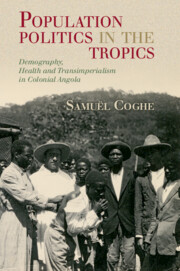Book contents
- Population Politics in the Tropics
- Global Health Histories
- Population Politics in the Tropics
- Copyright page
- Dedication
- Contents
- Maps
- Figures
- Tables
- Acknowledgements
- Note on the Spelling of Proper Names
- Introduction
- 1 Sleeping Sickness, Depopulation Anxieties and the Emergence of Population Politics
- 2 Tropical Medicine and Sleeping Sickness Control Before 1918
- 3 Introducing Social Medicine: Inter-Imperial Learning and the Assistência Médica aos Indígenas in the Interwar Period
- 4 Re-assessing Population Decline: Medical Demography and the Tensions of Statistical Knowledge
- 5 Saving the Children: Infant Mortality and the Politics of Motherhood
- 6 The Problem of Migration: Depopulation Anxieties, Border Politics and the Tensions of Empire
- Conclusion
- Epilogue: Demography and Population Politics, 1945–75
- Bibliography
- Index
6 - The Problem of Migration: Depopulation Anxieties, Border Politics and the Tensions of Empire
Published online by Cambridge University Press: 20 January 2022
- Population Politics in the Tropics
- Global Health Histories
- Population Politics in the Tropics
- Copyright page
- Dedication
- Contents
- Maps
- Figures
- Tables
- Acknowledgements
- Note on the Spelling of Proper Names
- Introduction
- 1 Sleeping Sickness, Depopulation Anxieties and the Emergence of Population Politics
- 2 Tropical Medicine and Sleeping Sickness Control Before 1918
- 3 Introducing Social Medicine: Inter-Imperial Learning and the Assistência Médica aos Indígenas in the Interwar Period
- 4 Re-assessing Population Decline: Medical Demography and the Tensions of Statistical Knowledge
- 5 Saving the Children: Infant Mortality and the Politics of Motherhood
- 6 The Problem of Migration: Depopulation Anxieties, Border Politics and the Tensions of Empire
- Conclusion
- Epilogue: Demography and Population Politics, 1945–75
- Bibliography
- Index
Summary
In January 1947, Captain Henrique Galvão, one of three deputies representing Angola in the National Assembly in Lisbon, submitted a secret report on Portugal’s colonial rule in Africa to the Assembly’s Colonial Committee.1 The 58-page report was extremely critical of the ‘native’ policy Portugal had thus far pursued in its indigenato colonies Angola, Mozambique and Guinea, colonies wherein a legal distinction was made between ‘citizens’ and ‘natives’. According to Galvão, the colonies were suffering heavy demographic losses from high mortality rates, notably among young children and contract labourers, and an increasing flow of African emigration into neighbouring colonies.2 These neighbouring colonies offered better work conditions and higher wages to the labourers, imposed lower taxes and set lower prices for consumables. They also provided better medical care and attracted Angolans via well-aimed propaganda and recruiting agents.3 All three colonies were affected, but Galvão claimed that emigration was particularly serious in Angola. He warned that ‘if this exodus continued at its current pace, it would, on its own, be sufficient to depopulate Angola in about thirty years’.4 Labour supply was already suffering and colonial rule itself would become unsustainable if the ‘demographic haemorrhage’ was not stemmed.5 In addition to direct economic and political consequences, Portugal’s prestige as a colonising nation was at risk: ‘Either we solve this problem, in a quick and determined manner […] or we will fail tragically, still in this century, and after five centuries of glory, in our mission of modern colonizers in Africa.’6
- Type
- Chapter
- Information
- Population Politics in the TropicsDemography, Health and Transimperialism in Colonial Angola, pp. 206 - 243Publisher: Cambridge University PressPrint publication year: 2022

